Papers by Mª Josep Cascant-Sempere

For years Colombia has been the world's largest coca producer. Its public management of crops for... more For years Colombia has been the world's largest coca producer. Its public management of crops for illicit use has swung between eradication, substitution, and, recently legalization. Forced eradication has been shown to be ineffective, and legalization is an incipient option, so the Peace Agreement puts forward substitution as the path to follow. Yet, what kind of substitution does it suggest? This article analyzes voluntary substitution projects in Peasant Reserve Zones. While some projects have evolved locally due in part to strong peasant associations, they have not gained traction nationally. In general, the difficulties inherent in any business play a role, but there are also structural limitations such as continued fumigations, obligations of prior eradication, the costs of production and transportation due to the lack of infrastructure and public services, and the issue of land rights, which limits peasants' access to the formal funding established by the Peace Agreement.

Community Development Journal , 2022
This case study engages critically with the challenges of integrating research into an internatio... more This case study engages critically with the challenges of integrating research into an international development programme. Recognizing knowledge production is currently dominated by western and colonial systems of meaning-making, the case study also explores how development research can be less extractive and how it can promote more equitable forms of knowledge production. This is explored and illustrated through the ethical challenges raised in the Evidence and Collaboration for Inclusive Development (ECID) programme. This was a four-year programme, funded by the UK Government, and delivered through a consortium of nine partners led by Christian Aid, and implemented by incountry partner organizations in Myanmar, Nigeria and Zimbabwe during 2019-2021. The article begins by contextualizing the ECID programme within the wider research environment and within the Nigerian country context (which is given particular focus). It then explores the ethical challenges that emerged from the programme and how these were addressed. The paper concludes by offering an innovative model for shifting power in development research and doing research ethically with communities in a development programme. This requires thinking about how ethics in

Development and Change
Integrating the demands raised by those most affected by poverty into international campaigns is ... more Integrating the demands raised by those most affected by poverty into international campaigns is important for safeguarding ethical integrity and encouraging mobilization. This article examines the case of the international non-governmental organization (INGO) ActionAid, which managed, although not without challenges, to integrate the tax complaints of market traders — such as multiple taxation — into its international tax justice campaign in Nigeria. The case provides an example of an INGO-driven campaign that created and nurtured bottom-up processes. The author argues that more could have been done to channel additional claims from traders — such as steep tax increases and tax harassment — and to support their actions, their visits and letters to the government, and their tax strikes. Overall, however, the INGO retained relevance by identifying campaign frames and targets at local, national and international levels while ensuring the campaign remained unified. The article contributes to debates about tokenism in international advocacy and argues that the use of social movement theory enriches the international advocacy literature as it promotes an understanding of campaigning processes. However, social movement theory still proves insufficient to fully understand political voice. Theories about hidden forms of resistance play a complementary role, unveiling more concealed political action, especially in repressive settings or contexts with weak civil societies.
Education Sciences, Mar 24, 2022
This article is an open access article distributed under the terms and conditions of the Creative... more This article is an open access article distributed under the terms and conditions of the Creative Commons Attribution (CC BY

Campaigning has become an important area of work for development NGOs (NGDOs). How political, in ... more Campaigning has become an important area of work for development NGOs (NGDOs). How political, in terms of public mobilising to confront authority, has it become? What frameworks can we best use to study this? Based on precedents such as della Porta and Diani's suggestion (2006) that social movement (SM) theory can be enlarged as a theory of collective action, I borrow six SM concepts-frames, repertoires, networks, mobilising structures, identity and political opportunities-threats. I then combine them with NGDO campaigning literature themes to explore those questions in a case study of ActionAid's Tax Justice Campaign (TJC) in Nigeria and the UK. ActionAid's TJC operates through two campaign formats-a single-issue format with one international claim and a multiple-issue format with claims specific to each level. Both formats exist in tension for campaign resources, yet combine to expose international and domestic causes of poverty in low-income countries. This example illustrates ActionAid's campaigning style: walking a tightrope to balance tensions and opportunities in its idea of 'campaigning'. This style also includes embracing moderate and radical supporter views on poverty and a structure of sponsorship and service-delivery programmes with campaigning accompanying them. For example, financial supporters mobilise towards confronting authorities alongside direct campaigner recruitment. Other NGDOs share this, with other ActionAid campaign features, which together shapes an understanding towards the idea of NGDO political action. I suggest that my findings contribute to both NGDO campaigning and SM theory. To NGDO campaign actors, SM theory provides a new vocabulary to study NGDO campaigning, particularly little explored dimensions in NGDO campaign literature such as state/authority confrontation and political identity. To SM theory, my findings offer an empirical contribution which helps position campaigning NGDOs as another type of contentious actor. At a practice level, ActionAid's multiple-issue campaigning may help prevent local tokenism in international campaigns.
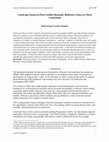
Journal of Education for International Development, 2009
Catch-up-Classes (CuCs) and Accelerated Learning Programmes (ALPs) are educational strategies aim... more Catch-up-Classes (CuCs) and Accelerated Learning Programmes (ALPs) are educational strategies aimed to compress years of formal education into a reduced span of time. These programmes are specifically targeted for young people (ages 10-24) who have had to abandon school due to situations of conflict or natural disasters and aim to "catch-up" students so that they may once again re-enter formal schooling. This article presents conclusions from an evaluation of a CuC programme implemented in Burundi by an International Non Governmental Organisation. It analyses three main constraints that were observed during the course of the study: 1) the lack of livelihood strategies for out-of-school youth; 2) the lack of a preliminary analysis of national educational needs in terms of demand (schools) and supply (students); and 3) the fragile economic and social sustainability of the CuC programme. Using these observations as a basis, the article calls for the debate to further identify the educational contexts in which CuC/ALP strategies can be most appropriate.
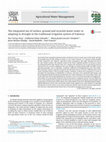
Agricultural Water Management, 2014
Successful farmer-managed irrigation systems are known to exist in various parts of the world, an... more Successful farmer-managed irrigation systems are known to exist in various parts of the world, and they are generally based on the sharing of surface or river water. However, it is unusual to find examples of both "integrated" and "adaptive" agricultural water management. This paper describes how one of the most famous systems, the irrigation system of the huerta (vegetable garden) of Valencia in Spain, has integrated ground and recycled water use. It analyzes the conjunctive use of every kind of resource and how this was crucial in adapting to the recent drought occurring between 2005 and 2008. Several operating principles, such as autonomy, contiguity, uniformity and proportionality, have been identified in previous research and shown to govern the allocation and use of water in different parts of the world, including Valencia. These principles produce conditions of equity and transparency. In order to investigate the perceptions of stakeholders in Valencia, interviews were conducted with farmers and the management boards of Irrigation Communities (ICs) and Groundwater User Associations (GUAs). The results show that the existing supplementary resources, such as recycled wastewater or Drought Emergency Wells, do not drastically change the way that the farmers manage the system. The main difference occurs in the regularity of the supply. On the other hand, the principles of autonomy, proportionality and transparency are also present in the ordinary use of groundwater from GUAs, although proportionality is defined differently in some GUAs. The farmers follow clearly defined rules, which produce an equitable and efficient use of the resource and create transparency. Results show that both existing organizations have devised a community-based system that is successful at managing water resources.
Dataset concerning the consequences of the COVID-19 pandemic and home confinement on the educatio... more Dataset concerning the consequences of the COVID-19 pandemic and home confinement on the educational community and families, and the possibilities and opportunities for the return to schools. Data were collected through an online based cross-sectional survey between June 29, 2020 and July 12, 2020 in Spain. A total of 7,305 people who had children in their care during the COVID-19 crisis and the home-confinement period responded to the survey. The survey contained items concerning (i) socio-demographic information, (ii) conciliation of work, personal and family life during confinement, (iii) the impact of the pandemic on the respondent's family, and (iv) the respondents' opinion on their child(ren)'s return to school.
This research in brief is a summary of ICTD Working Paper 80 by Kas Sempere : In the broad sense,... more This research in brief is a summary of ICTD Working Paper 80 by Kas Sempere : In the broad sense, ‘tax justice’ explores pro-poor and redistributive tax systems able to reduce inequality. It involves a transparent process of pro-poor collection (those who have less, pay less) and pro-poor expenditure (those who have less, receive more), for instance, through public services. Tax justice has become a popular concept at the international and national levels. For instance, reports and campaigns have exposed the unfairness of tax havens and harmful tax breaks. Yet, the idea of tax justice at the local level is less known and more needs to be done to unpack it.

Development and Change, 2022
Integrating the demands raised by those most affected by poverty into international campaigns is ... more Integrating the demands raised by those most affected by poverty into international campaigns is important for safeguarding ethical integrity and encouraging mobilization. This article examines the case of the international non-governmental organization (INGO) ActionAid, which managed, although not without challenges, to integrate the tax complaints of market traders — such as multiple taxation — into its international tax justice campaign in Nigeria. The case provides an example of an INGO-driven campaign that created and nurtured bottom-up processes. The author argues that more could have been done to channel additional claims from traders — such as steep tax increases and tax harassment — and to support their actions, their visits and letters to the government, and their tax strikes. Overall, however, the INGO retained relevance by identifying campaign frames and targets at local, national and international levels while ensuring the campaign remained unified. The article contributes to debates about tokenism in international advocacy and argues that the use of social movement theory enriches the international advocacy literature as it promotes an understanding of campaigning processes. However, social movement theory still proves insufficient to fully understand political voice. Theories about hidden forms of resistance play a complementary role, unveiling more concealed political action, especially in repressive settings or contexts with weak civil societies.
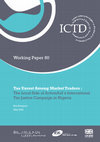
Tax justice has become a popular concept, and a number of international tax justice campaigns hav... more Tax justice has become a popular concept, and a number of international tax justice campaigns have exposed aspects such as the unfairness of tax havens and harmful tax breaks. Yet, the idea of tax justice at the local level is less well-known. The impact of campaigns to end tax havens and harmful tax competition may seem far from the lives and day-to-day tax struggles of many people living in poverty, including market traders in the informal sector. ActionAid, an international non-governmental organisation (NGO), managed, not without challenges, to integrate tax claims of market traders – such as multiple taxation – into its international tax justice campaign in Nigeria. Possibly more could have been done to include additional complaints from traders, such as those facing sudden and steep tax increases and tax harassment, and to support their actions – their visits and letters to the government, in addition to their tax strikes. Overall, however, ActionAid succeeded in linking...
Development in Practice, 2021
Can a service-delivery-born development NGO become a campaigning organisation? The short answer i... more Can a service-delivery-born development NGO become a campaigning organisation? The short answer is “yes, but”. In the past decade, ActionAid made bold steps, such as shifting its global strategy to...
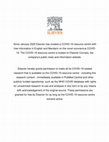
Data in Brief, 2021
This paper presents a dataset concerning the consequences of the COVID-19 pandemic and home confi... more This paper presents a dataset concerning the consequences of the COVID-19 pandemic and home confinement on the educational community and families, and the possibilities and opportunities for the return to schools. Data were collected through an online based cross-sectional survey between June 29, 2020 and July 12, 2020 in Spain. A total of 7,305 people who had children in their care during the COVID-19 crisis and the home-confinement period responded to the survey. The survey contained items concerning (i) socio-demographic information, (ii) conciliation of work, personal and family life during confinement, (iii) the impact of the pandemic on the respondent's family, and (iv) the respondents' opinion on their child(ren)'s return to school. Data were analysed using Stata (version 14) and are represented as frequencies and percentages based on responses to the entire survey. Researchers can use the dataset to analyse how home confinement impacted people with children in their care. Additionally, government authorities and education policymakers can use the data to ensure that schools respond to parents' main concerns in a pandemic context, as well as to be prepared to implement appropriate protocols in possible future similar crisis.
Cadernos de Agroecologia, 2021
Este ensaio faz parte do projeto de pesquisa (Re) conhecendo a agroecologia feministaagroecossist... more Este ensaio faz parte do projeto de pesquisa (Re) conhecendo a agroecologia feministaagroecossistemas e redes das agricultoras do Vale do Ribeira (SP, Brasil) e propõe uma investigação que amplia as pesquisas do campo da agroecologia feminista. Entendendo que ainda é pouco documentado as práticas agroecológicas das mulheres, foi realizada uma revisão bibliográfica organizada através da questão de como as mulheres manejam complexos agroecossistemas para dar continuidade a vida nos territórios. As experiências mostram que as mulheres estabelecem relações em seus territórios, com as pessoas e a natureza, que ultrapassam a dicotomia da produção e reprodução, e são importantes contribuições para se pensar uma nova maneira de olhar a economia e o mundo.
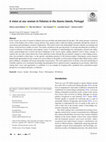
Maritime Studies, 2019
In the Azores, the work of women in fisheries has been invisible and undervalued for decades. Thi... more In the Azores, the work of women in fisheries has been invisible and undervalued for decades. This article presents a historical review of the hidden roles of these women and how they gained a place within the fishing community through the creation of associations and participatory research collaborations. This article reviews the relationships between scientists, government and fishers, which has been variable over time. This article contributes to the growing family of concepts describing the invisibility of women in fisheries in both policy and academic circles. It contributes to understanding how participatory research and collab-orative policymaking have evolved and faced challenges in the Azores region, adding empirical work to these concepts. It explores the way that women fishers have been embraced at times through the government's support to create fishing associations , but excluded at other times, via the specific consultation practices of the decision-makers. Participatory action research helped build opportunities for the women to be seen as fishers by the public as well as acknowledged within official circles, and to gain confidence, strengthen self-esteem and gender consciousness. This work explores how economic crisis and a prioritizing of scientific expertise over community knowledge and participation have reduced women's engagement in governance, effectively muting their voices and opportunity to contribute. It is an example for keeping both a gendered and a practitioner-expert perspective on research and policy on fisheries.
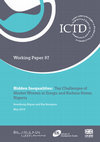
Working Paper (peer-reviewed), 2019
This paper presents the findings of a study on gender-based taxation differences among market tra... more This paper presents the findings of a study on gender-based taxation differences among market traders in two Nigerian states. At a high level, no significant differences were found between female and male traders in the markets visited in terms of tax payments, payments for market services and tax increases. However, a closer look at the data shows implicit tax biases that affect women negatively. Although female traders pay the same amount of presumptive tax as male traders, they earn much less. Even female traders selling the same types of products as their male counterparts tend to earn less. Additionally, common tax increases beyond the legally stipulated amount, as well as the burden of unpaid care work (that keeps women away from earning more money), also aggravate the observed anti-woman tax bias. Based on these findings we recommend, in line with suggestions made by interviewed market leaders, that Nigerian tax policymakers should develop a segmented system of presumptive taxation more closely based on actual earnings, or at least based on the type of product sold. Such segmentation would help to alleviate the gender bias inherent to the current presumptive taxation system. This study also finds that all market traders value the benefits of female tax collectors. In general, this preference is due to a perception among traders that female tax collectors are more understanding and calmer than male tax collectors. Female tax collectors were also not reported to be involved in asking for sexual favours, which was a complaint levelled against some of their male colleagues. Some markets have even taken the initiative to create mixed-gender tax collection groups, and to replace male tax collectors reported for harassing women sexually with female tax collectors. Based on these findings we recommend that, in line with previous literature, Nigerian tax authorities should work to integrate more female tax collectors into the public tax system, as well as in the market unions and associations that act as tax collection agents for the government. https://www.ictd.ac/publication/hidden-inequalities-tax-challenges-of-market-women-in-enugu-and-kaduna-states-nigeria/










Uploads
Papers by Mª Josep Cascant-Sempere